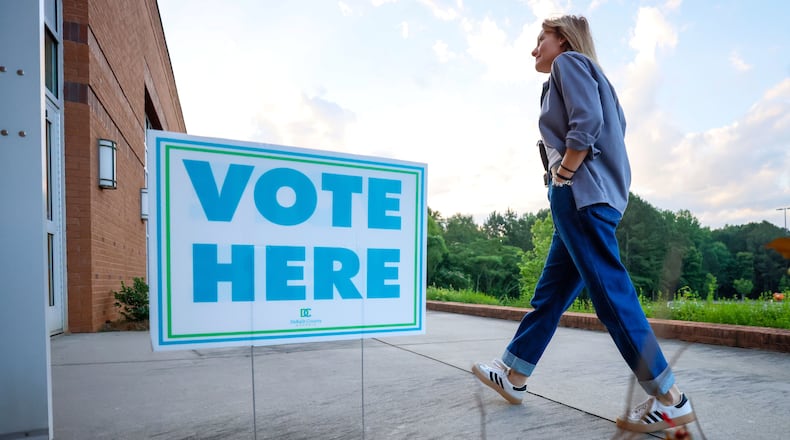At the Sept. 10 presidential debate, former President Donald Trump, while bragging about taking away women’s reproductive freedoms, falsely claimed that “each individual state is voting. It’s the vote of the people now…. I did a great service in doing it.”
Unfortunately, in Georgia, we lack the ability to introduce ballot initiatives and vote directly on issues, whether abortion or tax policy. The Georgia General Assembly has the sole power to place constitutional amendments and policy questions on the ballot for citizen review. For example, in the 2022 legislative session, the General Assembly put forward a tax exemption for timber farming equipment. It’s worth noting that Gov. Brian Kemp owns a timber farm.
Credit: Handout
Credit: Handout
Though the Legislature was willing to put this policy that benefited Kemp on the ballot, it refuses to let Georgians vote on expanding Medicaid, 90% of which is funded by the federal government. Expanding Medicaid would create up to 60,000 jobs and give as many as 600,000 Georgians health care coverage.
Georgians agree on more than political pundits and extreme politicians would like us to believe. A majority of Georgians support expanding Medicaid, restoring reproductive freedom and legalizing both sports betting and marijuana. The state would be better served if its residents had the ability to directly decide policy. When the legislature is too politically gridlocked to act on pressing issues, Georgians deserve the opportunity to find consensus and act on it.
In Michigan, citizen-led ballot initiatives have expanded voting rights, enshrined reproductive freedom into state law and legalized marijuana.
They didn’t stop there.
Michigan passed a ballot measure creating a Citizens Independent Redistricting Committee. In effect, this ended partisan gerrymandering, making elected officials more beholden to their communities than their parties. Voters now get to choose their elected officials, not the other way around.
Mississippi initially gave its citizens the ability to pass ballot initiatives in the early 1900s. This right was overturned by the State Supreme Court in 1922. For decades, a diverse coalition worked to reinstate this right. Ultimately, in 1992 a Republican governor restored citizens’ right to ballot initiatives.
In 2021, after Mississippi voters voted to legalize medical marijuana, the State Supreme Court again entirely overturned the rights of Mississippians to vote directly on policy issues that affect them. Republican leaders in Mississippi are now refusing to reinstate citizen ballot initiatives because they didn’t like what the voters had to say.
When people have the ability to vote directly on issues through ballot initiatives, we often demonstrate consensus. That’s why, in 2020, the top vote-getter in Florida was neither former President Donald Trump nor President Joe Biden but rather the $15 minimum wage. When there isn’t an R or a D, Americans actually agree on policy.
States with citizen-initiated ballot referendums, including Kentucky, Kansas, Ohio and Michigan, all restored reproductive freedom when it came to a vote. Missouri, Florida, Montana and Arizona are expected to vote to restore reproductive freedom on Nov. 5. As a Florida voter, Trump has said he will vote to uphold the state’s restrictive abortion ban and to legalize recreational marijuana.
Georgia politics and policy would be better served if citizens were able to introduce ballot initiatives and actually have a choice on the issues that impact their lives. Trump has that choice. Georgians deserve it too.
If Georgia law allowed its citizens to initiate ballot referendums, I suspect that in 2022, Georgia would have voted to restore reproductive freedoms. Republicans under the Gold Dome passed a near-total abortion ban in 2019 despite that it is clearly not what Georgians want or need.
Amber Thurman, a 28-year-old mother, tragically died while awaiting reproductive health care that was criminalized by Georgia Republicans. Georgians deserve better than elected officials who put politics and partisanship above the needs of the people they represent.
With the surgical gerrymandering and hyperpolarization of the legislature, Georgians’ ability to directly impact policy is stifled. Amending the Georgia Constitution to allow for statewide citizen-initiated ballot initiatives would allow Georgians to realize policy issues that the public agrees on but that our gridlocked politics won’t allow. We could expand Medicaid, which would be a lifeline to rural Georgia hospitals. Legalizing marijuana and forms of gambling could create substantial revenue sources that allow the state to invest in infrastructure and education. Creating a Citizens Independent Redistricting Commission would decrease polarization in the legislature and create electoral districts that represent communities, not parties.
It is time we consider empowering the people of Georgia with the right to choose.
Let us decide.
Parker Short is the former president of the Young Democrats of Georgia, a graduate of Dunwoody High School and the University of Michigan’s Ford School of Public Policy. He is a member of the Georgia Democratic Party State Committee. He has worked for the city of Atlanta, DeKalb County and Georgia State Sen. Nikki Merritt and as a Judiciary Committee intern for Sen. Jon Ossoff.





